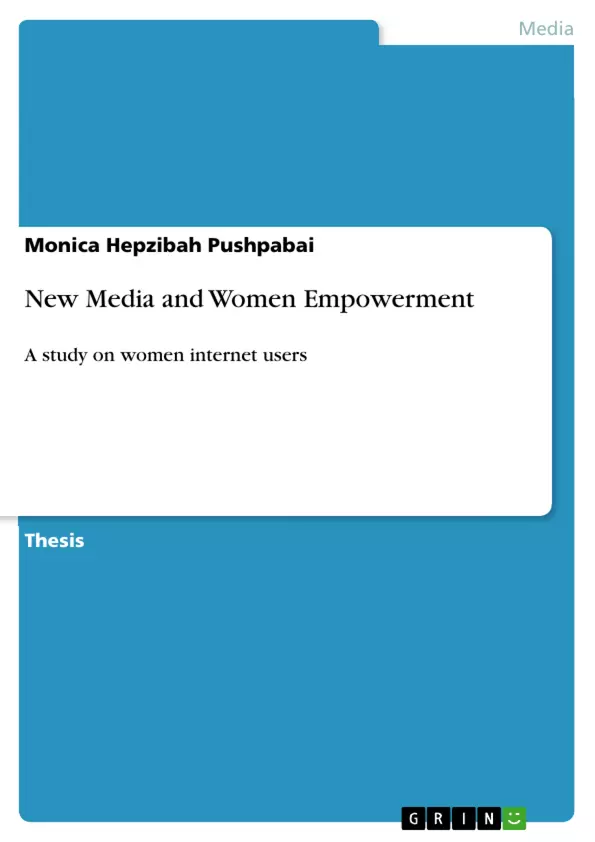
New Media and Women Empowerment
Abschlussarbeit, 2009
329 Seiten
Medien / Kommunikation - Multimedia, Internet, neue Technologien
Leseprobe
Inhaltsverzeichnis (Table of Contents)
- Chapter I: Introduction
- Chapter II: Background
Zielsetzung und Themenschwerpunkte (Objectives and Key Themes)
This research aims to explore the impact of the internet on women's empowerment in Tamil Nadu, India. It investigates how new media technologies, specifically the internet, contribute to or hinder women's empowerment in the region. The study also examines the broader context of women's status in Tamil Nadu, considering factors such as literacy rates, work participation, and political representation.
- The role of the internet in women's empowerment
- The status of women in Tamil Nadu
- The relationship between communication technologies and empowerment
- Comparison of internet usage and women's empowerment across different countries
- The challenges and opportunities presented by internet access for women
Zusammenfassung der Kapitel (Chapter Summaries)
Chapter I: Introduction: This chapter lays the groundwork for the research, defining key terms such as "new media," "internet," "woman," and "empowerment." It establishes the context by presenting statistics on women's status in Tamil Nadu, including literacy rates, work participation, and political representation. The chapter then highlights the rationale behind the research, emphasizing the gap in existing studies on the internet's role in women's empowerment, particularly within the specific context of Tamil Nadu. It outlines the research questions, objectives, scope, limitations, and the structure of the study, setting the stage for the subsequent chapters which delve deeper into the chosen subject matter.
Chapter II: Background: This chapter provides a comprehensive overview of the existing literature on Information and Communication Technologies (ICTs) and Computer-Mediated Communication (CMC) in relation to women's empowerment. It explores how employment opportunities are influenced by internet access and usage. It then analyzes the unique characteristics of the internet compared to other media, considering its potential for both empowerment and marginalization. The chapter further examines the global landscape of internet usage, providing case studies from various countries (including the United Kingdom, United States, Ghana, China, Nigeria, Jordan, Latin America, Somalia, Cambodia, and Canada) to illustrate diverse scenarios of internet access and its influence on women's lives. This comparative analysis allows the study to position the research within a broader international context.
Schlüsselwörter (Keywords)
Internet, women's empowerment, Tamil Nadu, new media, communication technologies, gender equality, ICTs, CMC, employment opportunities, literacy, political participation.
Häufig gestellte Fragen
What is the purpose of this document?
This document serves as a language preview for an academic research project. It includes the title, table of contents, objectives and key themes, chapter summaries, and keywords related to the study.
What is the research project about?
The research project explores the impact of the internet on women's empowerment in Tamil Nadu, India. It examines how internet technologies contribute to or hinder women's empowerment in this region.
What are the key themes of the research?
The key themes include the role of the internet in women's empowerment, the status of women in Tamil Nadu, the relationship between communication technologies and empowerment, a comparison of internet usage and women's empowerment across different countries, and the challenges and opportunities presented by internet access for women.
What is covered in Chapter I: Introduction?
Chapter I lays the groundwork for the research by defining key terms and presenting statistics on women's status in Tamil Nadu. It highlights the rationale behind the research, outlines research questions, objectives, scope, limitations, and the structure of the study.
What is covered in Chapter II: Background?
Chapter II provides an overview of existing literature on Information and Communication Technologies (ICTs) and Computer-Mediated Communication (CMC) in relation to women's empowerment. It analyzes the characteristics of the internet and examines case studies from various countries to illustrate diverse scenarios of internet access and its influence on women's lives.
What are the keywords associated with this research?
The keywords include: Internet, women's empowerment, Tamil Nadu, new media, communication technologies, gender equality, ICTs, CMC, employment opportunities, literacy, political participation.
What aspects of women's status in Tamil Nadu are considered?
The research considers literacy rates, work participation, and political representation of women in Tamil Nadu.
Which countries are referenced in the international comparison?
The document mentions case studies from the United Kingdom, United States, Ghana, China, Nigeria, Jordan, Latin America, Somalia, Cambodia, and Canada.
Details
- Titel
- New Media and Women Empowerment
- Untertitel
- A study on women internet users
- Veranstaltung
- Ph.D
- Autor
- Monica Hepzibah Pushpabai (Autor:in)
- Erscheinungsjahr
- 2009
- Seiten
- 329
- Katalognummer
- V1506274
- ISBN (Buch)
- 9783389073247
- Sprache
- Englisch
- Schlagworte
- New Media Women empowerment internet
- Produktsicherheit
- GRIN Publishing GmbH
- Preis (Ebook)
- US$ 0,99
- Preis (Book)
- US$ 56,99
- Arbeit zitieren
- Monica Hepzibah Pushpabai (Autor:in), 2009, New Media and Women Empowerment, München, Page::Imprint:: GRINVerlagOHG, https://www.diplomarbeiten24.de/document/1506274
- Autor werden
- Ihre Optionen
- Vertriebskanäle
- Premium Services
- Autorenprofil
- Textarten und Formate
- Services für Verlage, Hochschulen, Unternehmen

- © GRIN Publishing GmbH.
- Alle Inhalte urheberrechtlich geschützt. Kopieren und verbreiten untersagt.
- info@grin.com
- AGB
- Open Publishing
Der GRIN Verlag hat sich seit 1998 auf die Veröffentlichung akademischer eBooks und Bücher spezialisiert. Der GRIN Verlag steht damit als erstes Unternehmen für User Generated Quality Content. Die Verlagsseiten GRIN.com, Hausarbeiten.de und Diplomarbeiten24 bieten für Hochschullehrer, Absolventen und Studenten die ideale Plattform, wissenschaftliche Texte wie Hausarbeiten, Referate, Bachelorarbeiten, Masterarbeiten, Diplomarbeiten, Dissertationen und wissenschaftliche Aufsätze einem breiten Publikum zu präsentieren.
Kostenfreie Veröffentlichung: Hausarbeit, Bachelorarbeit, Diplomarbeit, Dissertation, Masterarbeit, Interpretation oder Referat jetzt veröffentlichen!
- GRIN Verlag GmbH
-
- Nymphenburger Str. 86
- 80636
- Munich, Deutschland
- +49 89-550559-0
- +49 89-550559-10
- info@grin.com
-









